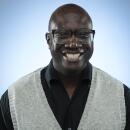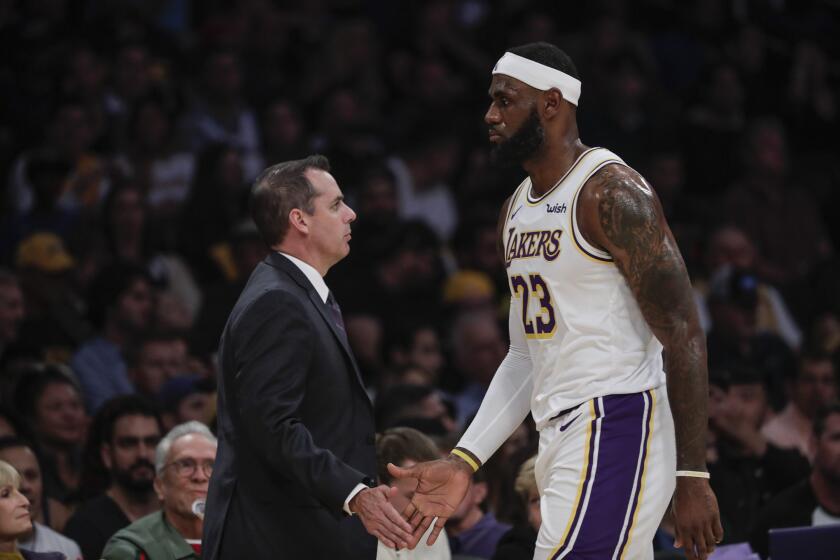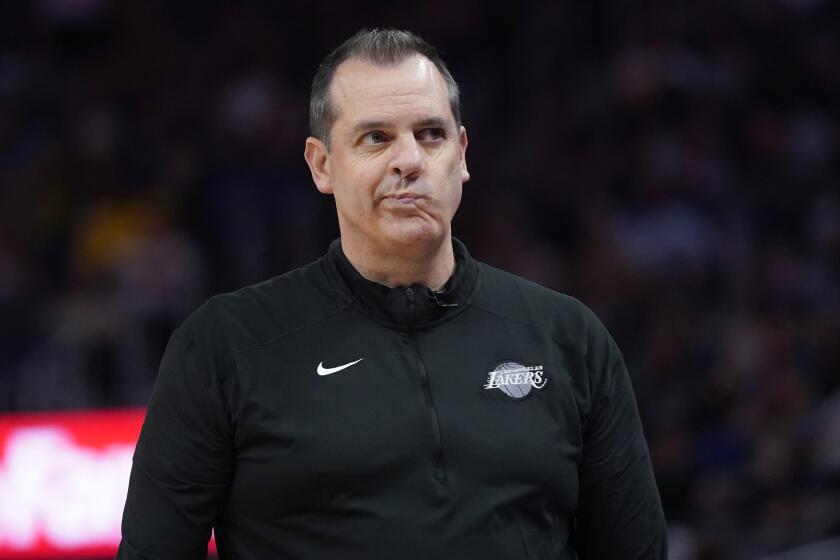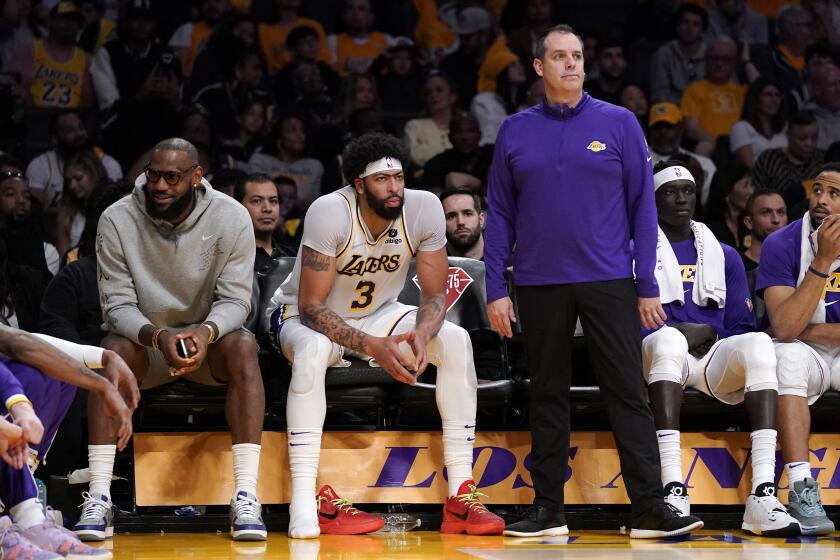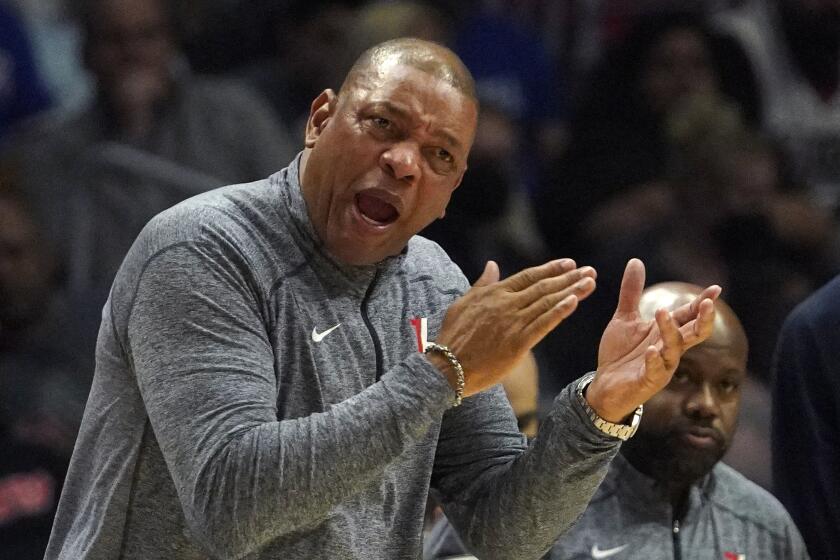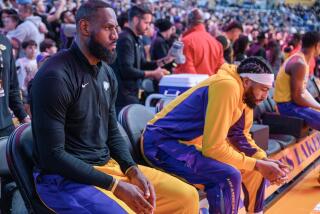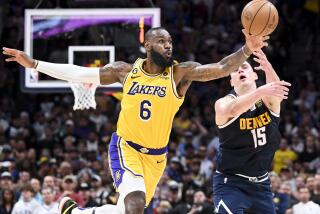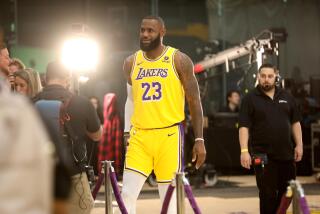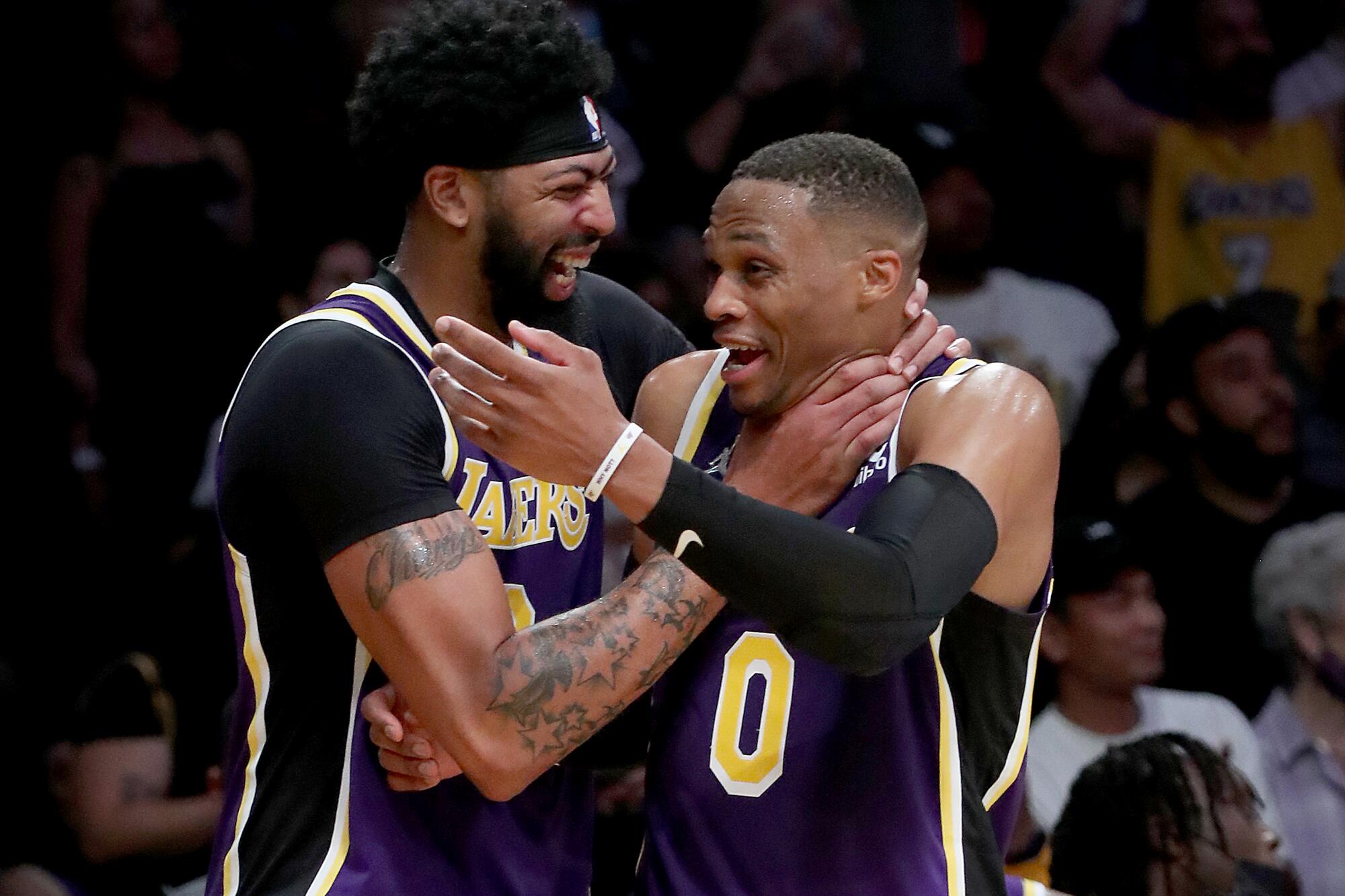
- Share via
The Los Angeles Lakers weren’t a sure thing; they were, though, the surest thing for bettors.
At the SuperBook inside the Westgate Las Vegas Resort and Casino just off the Strip, more tickets were printed predicting the Lakers would be champions than for anyone else, the betting public cementing their status as favorites by picking them ahead of the Phoenix Suns, Golden State Warriors, Milwaukee Bucks and Brooklyn Nets.
Money handed over to the SuperBook wagering on the Lakers to win the title accounted for nearly a quarter — 22% — of every dollar bet on 2022 title futures. From the moment the Lakers built this team until they were eliminated from postseason contention, no team had more money riding on them.
How could they not be favorites? It was a casual gambler’s dream — LeBron James, Anthony Davis and a buffet of familiar names.
Two seasons before, the Lakers were champions. The season after that, they looked like favorites again until injuries sidelined their hopes. In an aggressive response to that, the Lakers cashed in the few remaining assets they had in the offseason.
They dealt for former MVP Russell Westbrook. They signed future Hall of Famers Carmelo Anthony and Dwight Howard as well as possible Hall of Famer Rajon Rondo, who along with Howard helped them win it all in 2020.
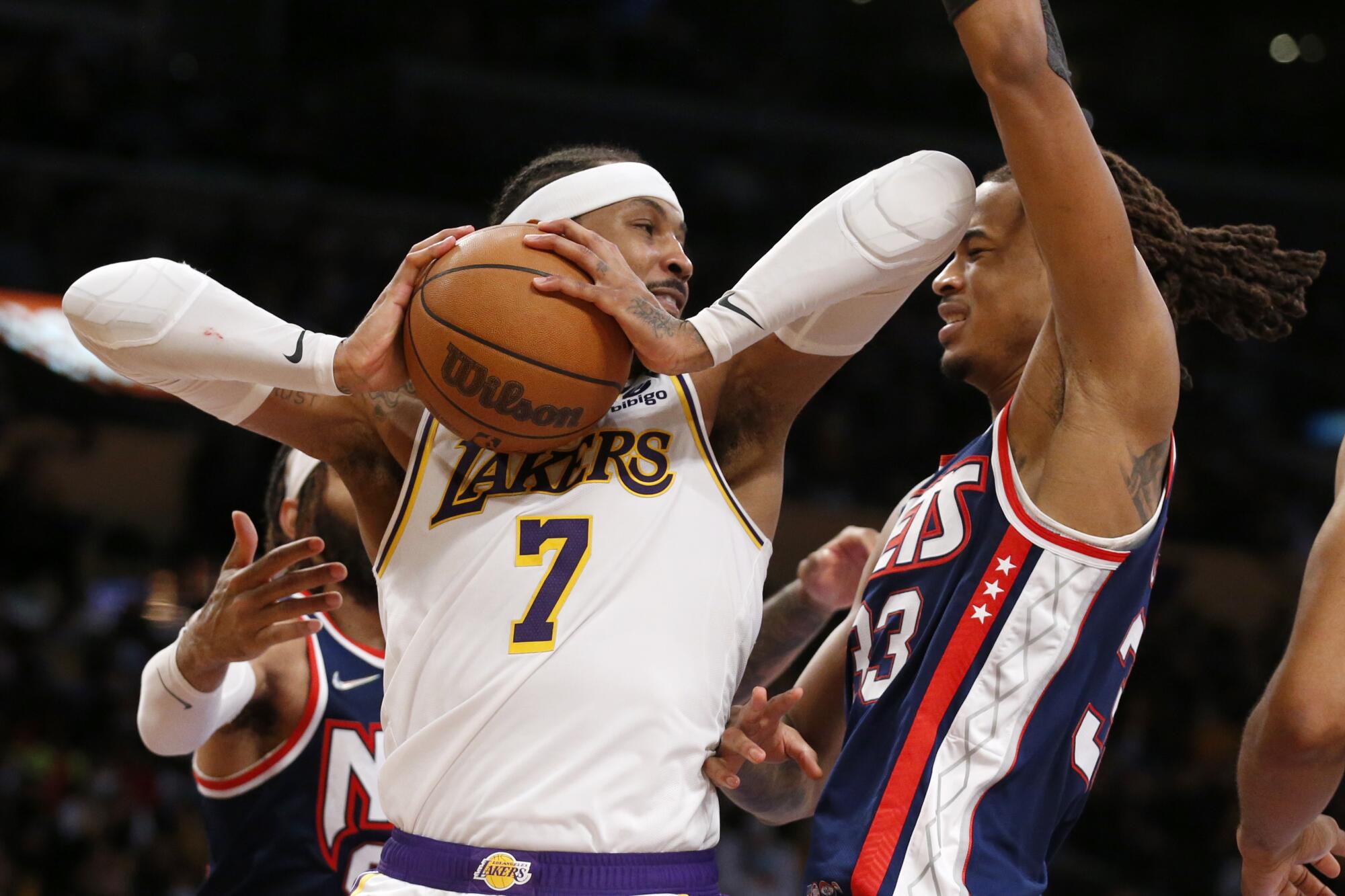
Needing perimeter shooters, they signed Wayne Ellington and Malik Monk. Needing two-way production, they brought back Kent Bazemore and Trevor Ariza. Wanting tenacity, they signed Kendrick Nunn. And needing more size, they brought former All-Star DeAndre Jordan back to Los Angeles.
Their coach, the Ted Lasso-ish Frank Vogel, had already proved he could navigate the Lakers through drama while constructing one of the NBA’s best defenses.
You didn’t need to know NBA rosters to know who was on the Lakers — it was the embodiment of All-NBA and All-Star teams from the league’s last decade.
In a city that loves its stars, the Lakers roster was a purple-and-gold constellation.
Yet like the images that flicker in the night sky, what everyone was seeing wasn’t live — they were tape-delayed projections from the past.
A wasted season later, it’s hard to see the Lakers as anything other than too old and too slow, with square pegs being pushed into round holes in between several players’ trips to the injury report.
“What happened?” one opposing player wondered after beating the Lakers recently. “… They stink.”
On the same day that LeBron James, Russell Westbrook, GM Rob Pelinka and others address the media, the Lakers fire coach Frank Vogel. Read more here.
A complex web of problems sunk the Lakers’ championship hopes, from a trade for a former MVP, to constant lineup and rotation changes, to significant injuries to their best players. It wasn’t one thing. It was closer to everything.
Tuesday, it all ended — the Lakers officially were eliminated from the NBA’s 20-team postseason. Whether it was those trips to the windows in Vegas or the Lakers’ $150-million payroll, trusting in this team turned out to be money poorly spent.
The Lakers head into their final two games with James sidelined for the weekend, on an eight-game losing streak, and owning a .388 winning percentage.
The Times talked to 20 coaches, players, scouts and executives with the Lakers and some rivals to gather the back story and recount the most disappointing season in franchise history. Many spoke on condition of anonymity because of their positions within the Lakers or their organizations.
“I’m the point guard. Give me that s—. Everybody get out the way.”
— One Lakers staff member, speaking on condition of anonymity, said of Russell Westbrook’s mentality during training camp.
LeBron James, Anthony Davis and Jared Dudley huddled after the 2020-21 season to plot a return to the NBA Finals.
Convinced they needed more star talent after struggling while James and Davis were sidelined by injuries last season, the group scanned the league for a new partner.
On most teams, that task would fall to the front office. On the Lakers, with their collaborative front office, it meant locker-room leaders had permission to canvas the league.
James, Davis and Dudley checked on Bradley Beal, gauging the All-Star guard’s desire about a trade. They knew the Lakers didn’t have the assets for Damian Lillard. They wondered about another run at All-Star point guard Kyle Lowry after the team failed to trade for him at the deadline in the winter.
They thought about DeMar DeRozan, another All-Star guard who according to a source was willing to return to Los Angeles to play with the Lakers — but not the Clippers — before nixing the idea because of concerns regarding his role.
It became clear that Westbrook was the right target — a player they wanted to work with, who, most importantly, the Lakers could actually acquire.

Westbrook met with James and Davis, the three players talking about shifting roles and tabling egos. Davis, who had been mostly averse to the idea, would play center. James would shift to power forward.
There was a suddenness to the deal, insiders around the league believing that the team had already finalized a deal with Sacramento for shooting guard Buddy Hield before re-allocating assets to get Westbrook.
“Ultimately the biggest thing for me is when you’ve been in this league and you know teams that actually want you, that actually want you to be in place,” Westbrook said at his introductory news conference last summer. “To me that means more than anything else.”
“Russ never respected Frank from Day 1.”
— A Lakers staff member with knowledge of the situation said speaking on condition of anonymity
Problems arose for the Lakers behind closed doors during training camp, with team staff members seeing their worst fears realized before the team played a game.
“Russ [Westbrook] never respected Frank [Vogel] from Day 1,” said one Lakers staff member with knowledge of the situation. “The moment Frank said anybody who gets the rebound can bring it up the court, which is just how the NBA is played these days, Russ was like, ‘Naw, I’m the point guard. Give the ball to me. Everybody run. Frank was like, ‘No, we have Talen [Horton-Tucker] We have Austin [Reaves]. We have Malik. We have LeBron. We have AD. They can all bring the ball up.’ He was like, ‘Nope, I’m the point guard. Give me that s—. Everybody get out the way.’
“From that point on, in training camp, it was a wrap, ‘cause now Russ is a fish out of water. He doesn’t know what to do. That’s how that started.”
For Vogel, it was the first sign of a significant challenge. Despite winning an NBA title in 2020, Vogel received only a minor endorsement in the form of a one-year contract extension before the season. It quickly became clear that making things work with Westbrook would be difficult.
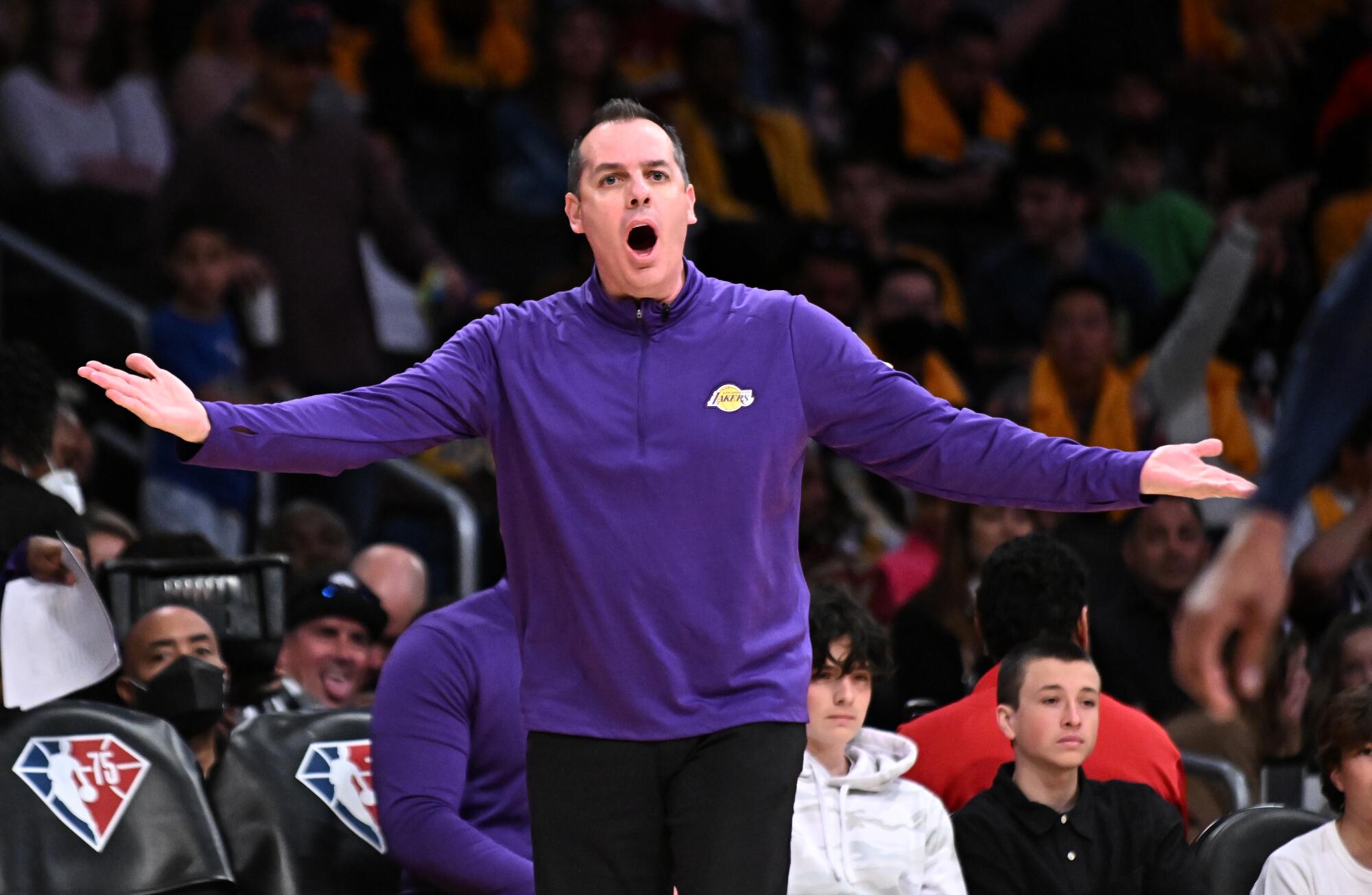
On opening night at Staples Center, Westbrook shot four for 13 from the field and scored just eight points, the home crowd murmuring when he’d rise to shoot from the perimeter.
After the game, he answered five questions with 64 words. By the end of the season, he was being booed by the Lakers fans and became combative with the media.
Westbrook was the most visible issue — the lone Lakers’ star without injury problems — and the player with the toughest job. Someone who became an MVP with a do-it-all mindset was expected to do less despite James and Davis saying the Lakers needed “Russ to be Russ.”
Despite an easy schedule, the Lakers mostly floundered, hovering around .500 while Westbrook struggled.
The Lakers fired coach Frank Vogel after a disappointing, injury-plagued season two years after he led the team to the franchise’s 17th NBA title.
As it became increasingly obvious that Westbrook‘s talents didn’t mesh on a roster with James, some Lakers staffers wondered if the team had made a critical mistake by not re-signing Dudley to serve as a locker-room buffer between stars while aiding in Westbrook’s integration.
Dudley had retired and joined former Lakers assistant coach Jason Kidd‘s staff in Dallas. Rondo, another locker-room leader, was traded to Cleveland on Jan. 3.
The runway with Westbrook felt incredibly short, and the Lakers preached patience.
During his first triple-double with the Lakers, five games into the season, he had 10 turnovers. In early January, he missed more than 10 shots in four consecutive games, and the arena speakers in Sacramento were trolling him by playing Foreigner’s “Cold as Ice.”
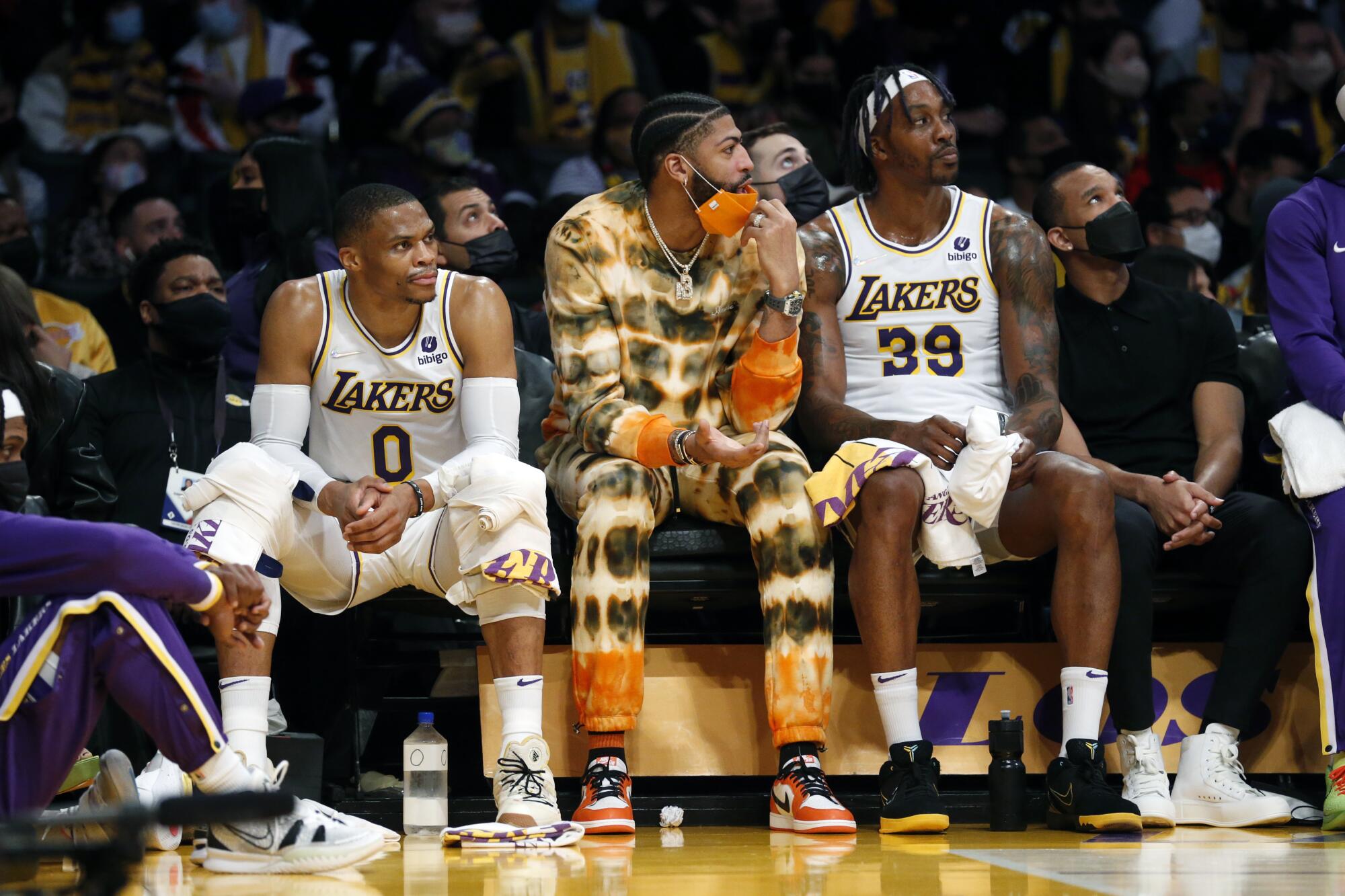
Three games later in a loss at home to Indiana, Vogel benched Westbrook in the fourth quarter, and though Westbrook was willing to speak to the media after the game, members of the organization told him not to out of fear he would criticize Vogel.
Vogel later benched him again in crunch time in a win over New York.
“He’s the coach. He makes the decision on whatever he feels is best for his team,” Westbrook said after the win. “Like I said, the most important part is not about myself, it’s about our team. We won the game and that’s the most important part.”
Westbrook continued to struggle. Those in the Lakers organization and outside it noticed. Teammates struggled to cope.
“My game is not predicated on shots or if I turn the ball over,” Westbrook said in January. “Like any other player, I can do that. I can turn the ball over, too. That’s all a part of the game. … That’s all about being a basketball player.”
Lakers GM Rob Pelinka and advisor Kurt Rambis will face a big challenge to put together a championship roster for next season with their Big Three.
Those misses were often dramatic. Airballs. Errant banked shots. Inexplicable turnovers.
“As a leader, my job is for myself not to get frustrated,” James said early in the season. “If I don’t get frustrated, I think it will trickle down to everyone else. I’ve never been a person that’s OK with not being excellent. But I understand, you know, things take time as well. As long as I keep the main thing the main thing, stay even keel throughout whatever is going with our ballclub, then we’ll be fine.”
It was another plan gone awry.
Midway through the season, players began to notice James’ body language after poor Westbrook play, an on-court sign of recognition that his and the Lakers’ plan wasn’t going to work. Some Lakers players were bothered by how regularly James’ shoulders would slump and how his head would hang after botched opportunities to score or defend.
Vogel, though, was the driving force in keeping Westbrook in the starting lineup, resisting pushes from staff and players to bring Westbrook off the bench.
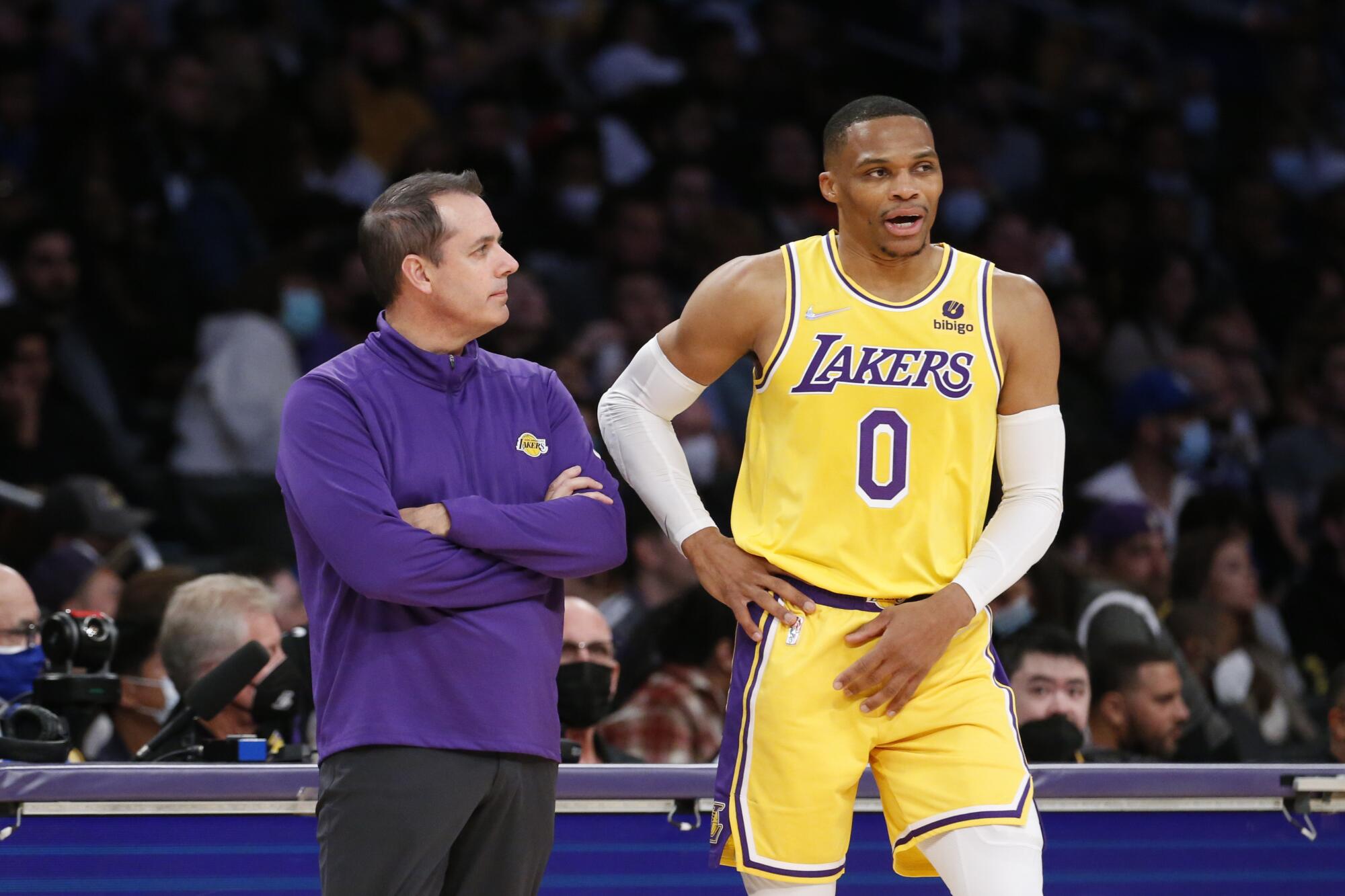
While Westbrook frustrated coaches and teammates with his on-court stubbornness, he was well-liked away from the game.
Yet the pressure mounted, Westbrook taking the unusual step to speak out about fans and TV personalities who began calling him “Westbrick.”
Following a loss in San Antonio, Westbrook said the name-calling affected his family. “Like, I don’t even want to bring my kids to the game because I don’t want them to hear people calling their dad nicknames.”
Yet Vogel continued to believe that Westbrook would find a rhythm, and finally his play actually improved as the season wound down.
In the 15 games before their postseason elimination, Westbrook seemed to find his place amid the Lakers’ chaos, averaging 19.9 points on 49.4% shooting, 6.6 rebounds and 6.5 assists. The Lakers, though, went 3-12 in those games.
Asked how he thought Vogel and his assistants handled attempts to figure out the Lakers’ problems this season after losing to Denver on Sunday, Westbrook seemed to take a shot at Vogel.
“They’ve done things that they felt were best for our team,” he said, “and I’ll leave it at that.”
“This season is b—.”
— A Lakers veteran player, who spoke on condition of anonymity.
While the Lakers were dealing with Westbrook, Vogel and his coaching staff were trying to sort out their vision for the team — a flawed roster they believed had the versatility to handle a variety of challenges. Eventually, Vogel and his staff knew what they had lost.
By trading wings Kentavious Caldwell-Pope and Kyle Kuzma and letting guards Alex Caruso and Dennis Schroeder leave in free agency, the team’s perimeter defense had been gutted.
Privately, Vogel joked about the Lakers leading the NBA in blocked shots — not because of their interior defense but because of the frequency opposing guards would get into the paint to challenge the Lakers’ frontcourt.
Rob Pelinka, the team’s vice president of basketball operations and general manager, said in the preseason he believed the team would have enough perimeter defense with Bazemore and Ariza. Scouts believed that Nunn could be their best perimeter defender.
But Ariza needed ankle surgery in training camp, Nunn’s sore ankle turned into a knee bruise that knocked him out for the season, and Bazemore was pushed out of the starting lineup 13 games into the season.
To help their defensive issues, the team added Avery Bradley after he was cut by Golden State. Undrafted rookie Austin Reaves earned significant minutes because of his tenacity.
NBA scouts joked about how frequently opposing teams would have four or even five players on the court that they liked more than the Lakers’ players.
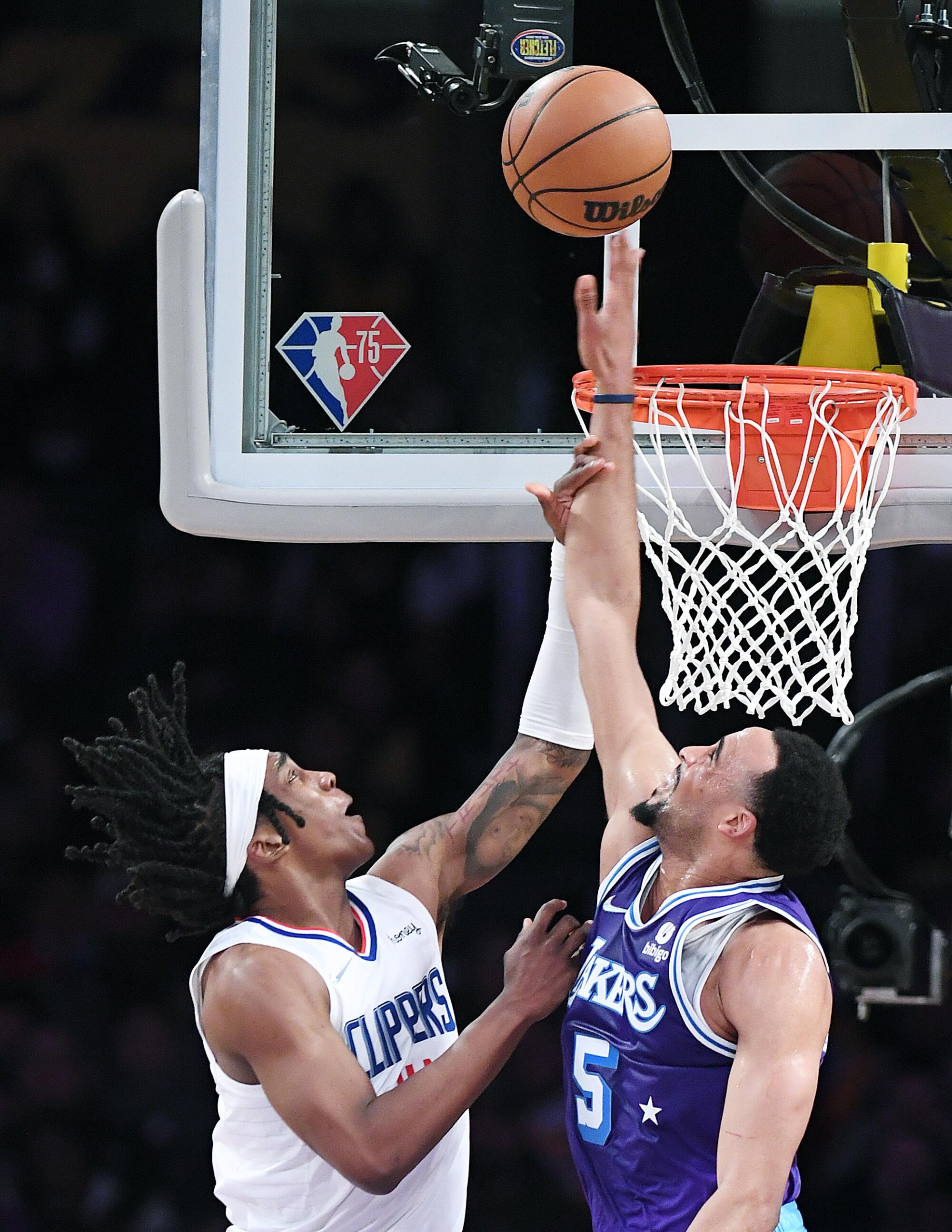
Yet for all the discussions about the clunky offensive fit between James and Westbrook, the Lakers and Vogel soon learned that the two worked even worse together on defense.
It set a conflict internally for the Lakers that they never solved, with Vogel, one of the NBA’s best defensive coaches, trying to find a way for the team to be competent on that side of the ball.
“We don’t have a great offensive team, but we are more offense than we are defense, and Frank has to adjust to that,” one Lakers staffer said. “You got to live with the fact that your defense isn’t going to be top three. And you hope it’s top 20, and then your offense is good enough to move it. But that’s the hard part.”
Vogel acknowledged that was a struggle during the season.
“If an offensive lineup is what you feel is gonna win the most games, you have to put [defense] aside and just go with it. I’ve done that a lot this year,” he said March 21. “It hasn’t resulted in enough wins, and it’s been very disappointing some of the defensive performances we put out. But you have to make the pieces fit offensively for us to win.”
The Lakers would end up being below average on both ends of the court. After being a top-three defense in each of their last two seasons under Vogel, the Lakers are 21st. Compounding things, the offense never produced either, the Lakers ranking 24th.
Then there was the team’s age — a running joke in the NBA offseason that James addressed on media day at the start of the season. The team broke camp with five players 35 or older, and it was instantly clear that the team needed more youth and athleticism, particularly on the wing.
You might not like him, maybe you revile him, but Doc Rivers is the right coach to replace Frank Vogel, writes L.A. Times columnist Bill Plaschke.
In-season additions of forwards Stanley Johnson and Wenyen Gabriel helped, but neither could seriously be viewed as solutions. Still, it was striking to scouts and executives how much anyone with youth and athleticism stood out against the Lakers’ canvas of old and slow.
Due to injuries, a midseason COVID-19 outbreak and mounting losses, Vogel abandoned one of his core beliefs — a principle based around stability — and scrambled to find groupings that would work.
The flaws of the roster were everywhere he looked — the guys who could score unable to defend, the ones who could defend unable to score, and the ones who could do both often injured. Their signings in the summer didn’t help — Nunn never played, and Horton-Tucker became ineffective particularly in pairings with Westbrook.
“Well, the plan of what we thought we’d look like to start the season got ripped up very early. And we’ve been seeking for something ever since,” Vogel said before a late-season loss to the Jazz in Utah. “We’ve got some guys that have brought us some energy that we’re hoping can get us over the hump. I’m a coach that, honestly, prides myself on a boring rotation and erring too, too much on the side of stability. And I’ve not been able to do that this year and that’s been very difficult for me as a head coach.”
He survived a possible midseason firing, with the lack of job security hanging over his head the rest of the season.
Nothing ever felt settled, the ground underneath the team’s feet constantly shifting in an effort to find the right move that would save them. Opposing scouts said they saw Lakers players ignoring their coaches’ instruction.
In what was one of the Lakers’ last real shots to save their season at Crypto.com arena, Vogel used his 38th starting lineup of the season.
“How can you win like that,” James wondered as he left the arena after a 114-111 loss to New Orleans on April 1. “F— impossible.”
Yet those defending Vogel would point to nothing working, no lineup worthy of getting a consistent look because of mismatched talent. In the end, it left the coaches to do an endless search while leaving veteran players caught in and out of the team’s rotations at various times of the season.
“This season,” one of those veterans said, “is b—.”
“I’m literally having the time of my life right now.”
— LeBron James, after a win in Cleveland when the Lakers were still in postseason contention
Fifteen days before the Lakers were officially eliminated from the postseason, everyone was smiling.
Westbrook walked through a back hallway at Quicken Loans Arena in Cleveland and joked about taunting Cavaliers defender Isaac Okoro, who was slow to close out on him as he drilled a three-point shot.
James joked about retroactively taking two points off the board, his dunk on friend Kevin Love the topic of conversation that had the media laughing as James wondered if he’d still be invited to Love’s wedding.
“I’m literally having the time of my life right now,” James said. “The game’s such a beautiful thing and just as long as I’m healthy enough to put on the uniform I’m going to play with a lot of passion, a lot of energy, give my teammates what they deserve, what they need.”
Vogel, aware that his team should be getting back Davis soon, saw the Lakers inching toward being the team he envisioned.
“We knew there were going to be some ugly nights with an older team over the course of an 82-game season,” Vogel said. “We knew there were going to be some. There have been more than we had hoped. But we showed resilience. And we showed resilience in the form of ball movement and offensive execution. And to see our guys play the way we played, we had 34 assists, it just again gives us confidence about what we can be down the stretch.”
It was the last time the Lakers won.
The positive vibes were quickly undone, James missing the Lakers’ next game because of knee soreness. The following game, in New Orleans for the first of two late-season meetings with the Pelicans, James sprained his ankle, ripping the heart out of the team. He would play one more game.
For all of the Lakers’ flaws, the belief that the team could somehow salvage things late was very real as they fought to stay in the postseason’s play-in position, and the reason that belief existed was because of James and Davis.
As the Lakers made their run to the 2020 NBA championship, rival scouts and executives weren’t uniformly enamored with the Lakers’ roster. The general sense was that as long as Davis and James were on the court and healthy, the Lakers could — and maybe should — beat anybody.
Injuries cost them that chance a year ago, and it was an even bigger issue this season.
The two played just 22 games together this season, never for any extended stretches. The most was a five-game span before the All-Star break, ending with Davis’ foot injury during a game against the Jazz.
“I’m disappointed that we haven’t had a chance to have our full team, whether it’s myself out, LB out or other guys,” Davis said after the Lakers were eliminated. “It’s a disappointing thing. Not sure how good we could have been.… And as one of the leaders of the team, especially on the defensive end of the floor, where guys need me the most, wasn’t able to be out there.
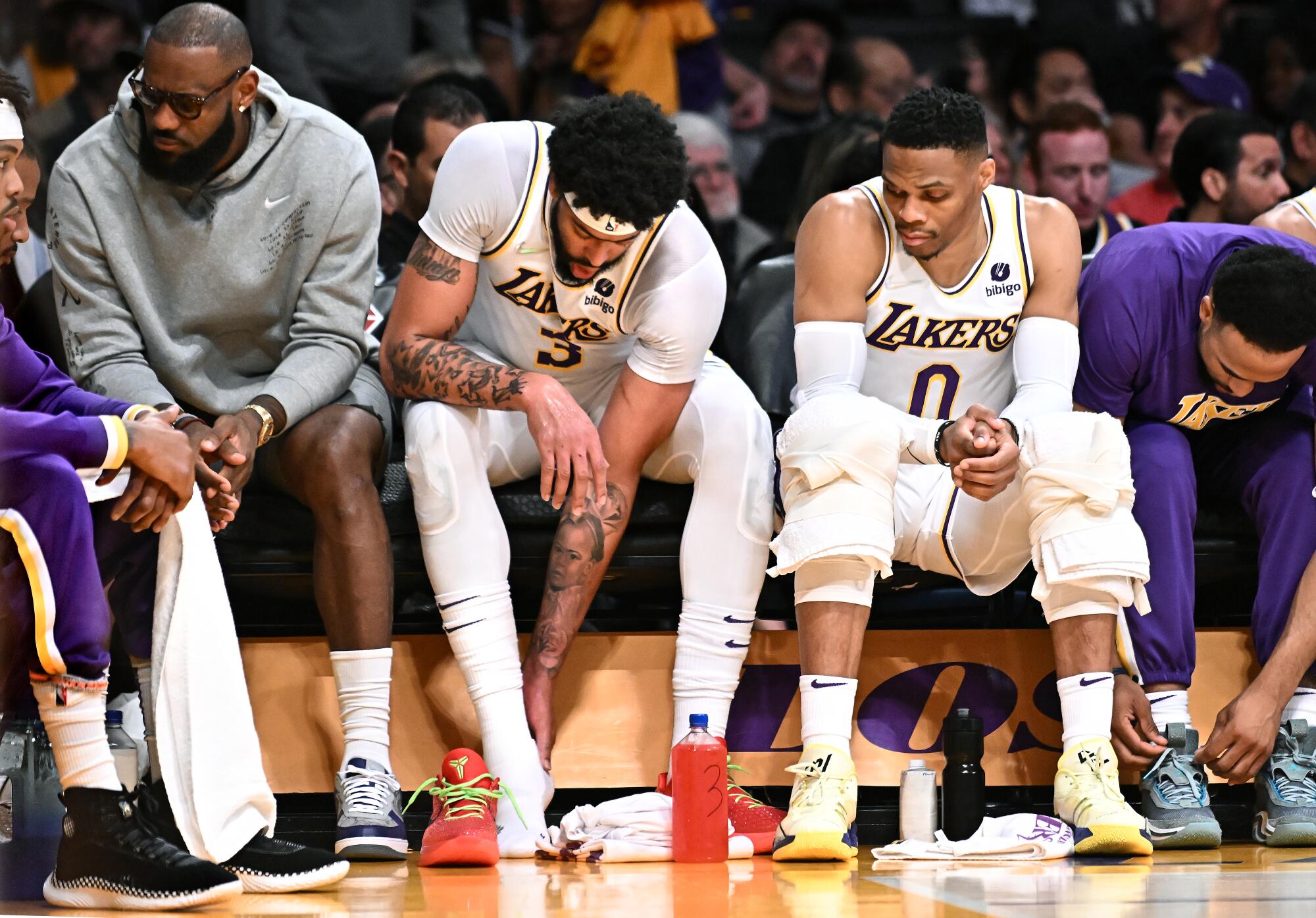
“Sucks for me. Sucks for our team, our organization.”
Both of Davis’ injuries this season, the first to his knee and the second to his foot, were bad luck — a player falling onto his knee and his foot landing on someone else’s. James dealt with ankle and knee problems during the season.
Despite his injuries, James had one of the best offensive seasons of his career, averaging 30.3 points on 52.4% shooting.
The Lakers were 11-11 when the two played. In one stretch, the Lakers went 3-0 — but the wins came against Cleveland and a two-game homestand with the Houston Rockets. Any projection about the caliber of the team, even with James and Davis healthy, is still speculative.
The result of James missing 23 games and Davis missing 40 before Friday was a wasted season. The team never was more than three games above .500. They ended the season with the last winning streak coming in early January. Every other team in the NBA had stumbled into at least one winning streak since the Lakers last had positive momentum.
Now the organization, just like its stars, limps into the offseason.
A coaching change is almost a lock. A decision about whether to trade Westbrook — and then a hunt to find a landing spot — loom. A roster overhaul will come next with limited salary-cap space and a light cache of assets, their next tradeable first-round pick in 2027.
The Lakers went from favorites to everyone’s favorite team to dog, an easy target after a hard fall from the highest expectations to embarrassing lows.
Can the Lakers figure it out, regroup and reset, then push for a title again next season?
It’s a gamble, no matter how bad the odds, that they’re going to have to make.
More to Read
All things Lakers, all the time.
Get all the Lakers news you need in Dan Woike's weekly newsletter.
You may occasionally receive promotional content from the Los Angeles Times.

